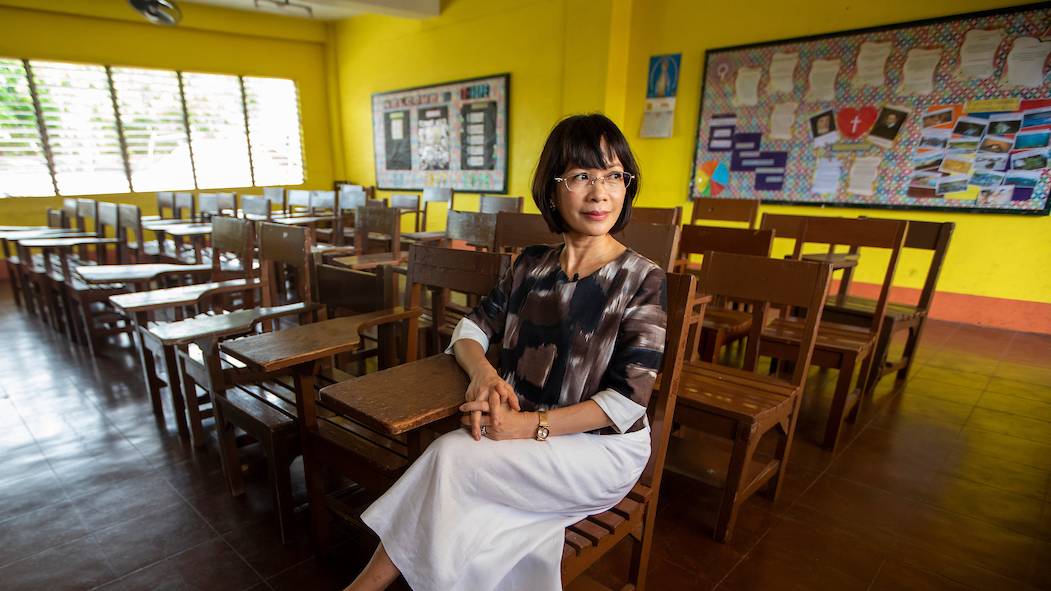
Long before Astrid S. Tuminez became a college graduate — long before she lived in
New York City and the Soviet Union and Hong Kong and Singapore, before she published
a book and many articles and helped broker peace negotiations and held leadership
positions at universities and corporations, and before she was chosen as Utah Valley
University’s seventh president — she learned to dream.
From a tiny hut on the beach in the Philippine city of Iloilo, through holes in the
grass roof that always needed patching and from which water poured during rainy weather,
sending her scrambling for the shelter of the family table, Tuminez could look up
and see the stars. For her, she says, the stars symbolized dreams. And dreams were
free.
“I realized no matter how poor you are, you could actually dream,” she says. “Nobody
can stop you from dreaming about where you want to be, and what you want to do with
your life.”
If that sounds unrealistic, you haven’t met Astrid Tuminez. Her life is a flourishing
example of the power of dreams — and the role education plays in achieving them. As
she begins her service as UVU president this September, her goal is to pass on that
transformative power to all the people that she can reach.
“To believe in what is possible, whatever the hurdles and challenges are — that’s
the culture I’d like UVU to have,” Tuminez says.
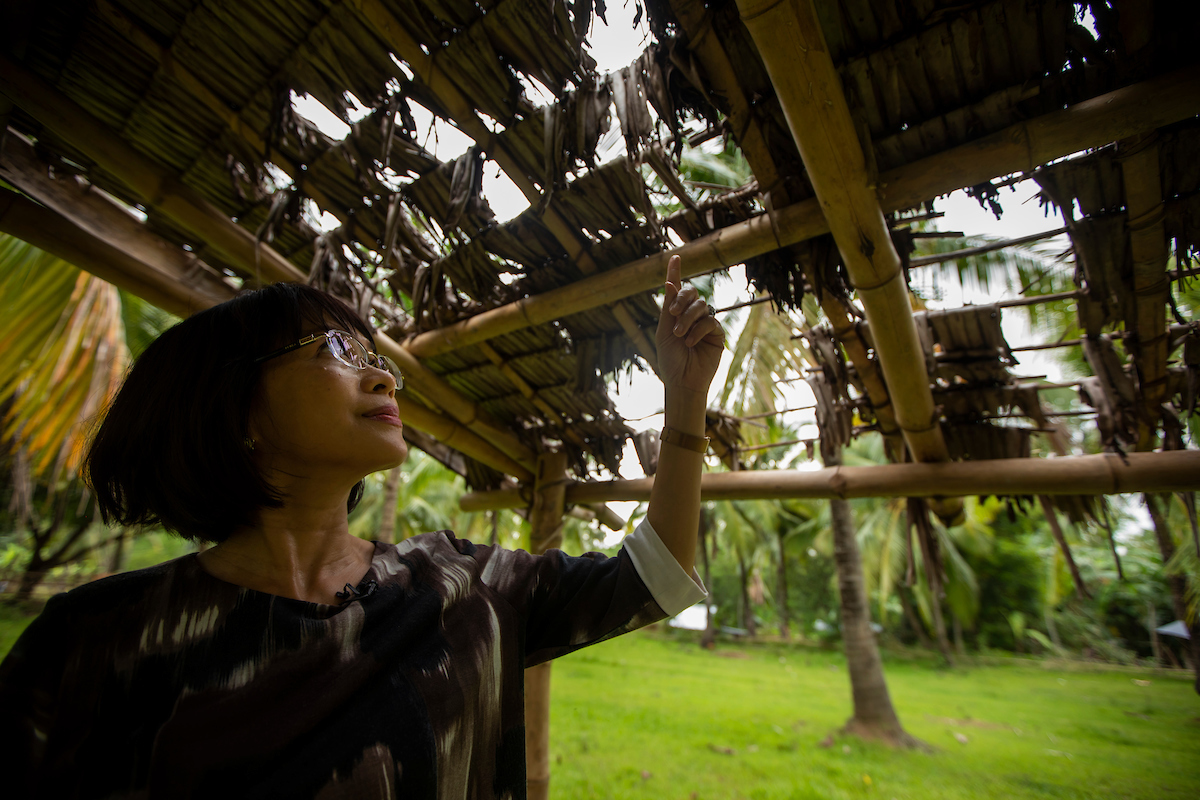
Astrid Tuminez was the sixth of seven children born to Redencion Segovia and Lazaro
Terre Tuminez, in a village called Pali in the Philippine province of Iloilo, an hour
south of Manila by air. When Astrid was two years old, the family moved to the city
in search of better educational opportunities. After helping a local politician win
an election, her mother received a land allocation in a squatter area by the sea.
There, the family built a hut from bamboo and nipa grass, suspended on bamboo posts
above the ocean.
While neither parent was formally educated beyond high school, Tuminez describes them
both as intelligent and curious — “They had opinions about everything,” she says —
and singles out her mother in particular as inventive, creative, and resilient.
“My mother was the one with the ambition to move us to the city,” Tuminez says, “even
though we had to live in the slums. She knew that her children’s future would be in
the urban area. My father was more relaxed about the future. He was the kind of person
who could be quite content to just sit under a coconut tree and dream.”
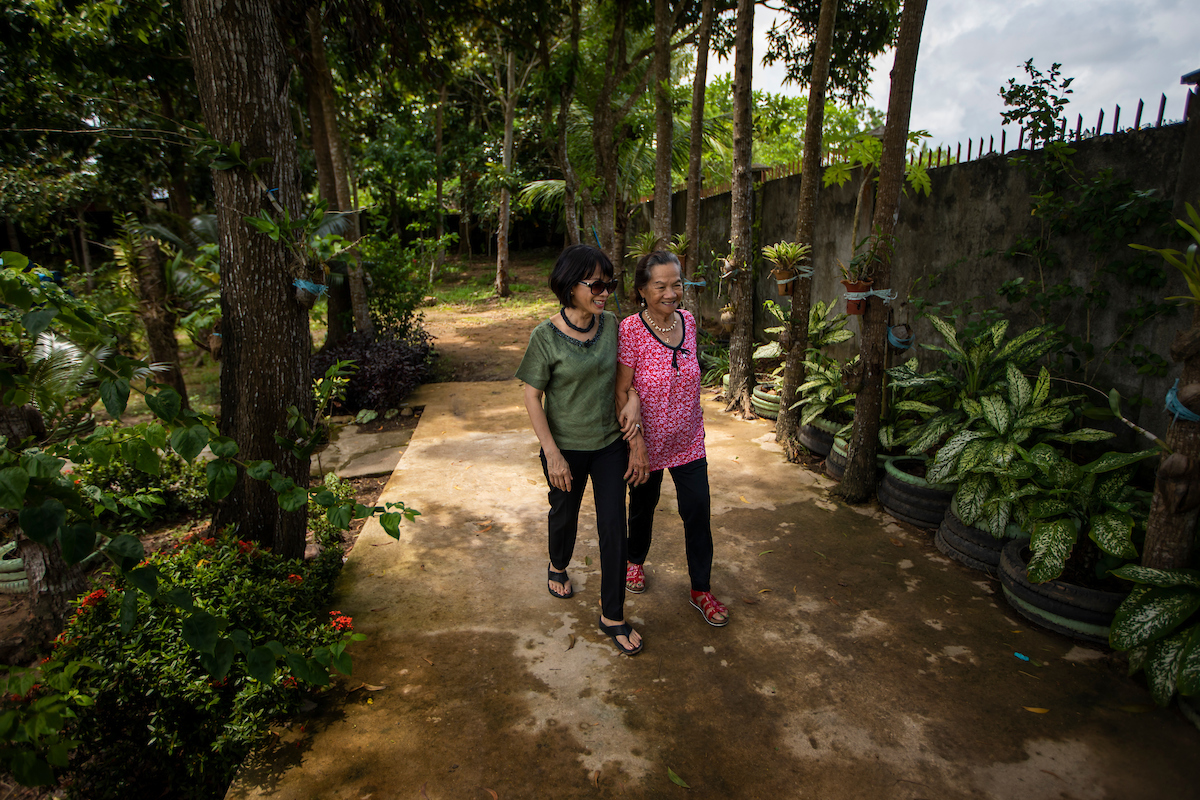
Her father showed Tuminez the art of equanimity along with positive thinking. He could
be unruffled even under the worst circumstances. When her baby sister suffered a high
fever for several days, and they had no means to take her to the doctor, Tuminez and
her siblings feared the worst. But her father reassured them.
“My father sat on the balcony of our hut, told us we should all be calm, and that
whatever will happen will happen,” Tuminez says. “I thought, ‘Wow, how can he think
like that?’ But there's also a certain strength to that. That was my father. He was
a gentle soul, and I loved that about him.”
Tuminez inherited her mother’s inventiveness and her father’s positivity. Both served
her well in the slums of Iloilo, where the problems created by poverty required practical
solutions. For example, Tuminez describes stuffing her tattered shoes with lollipop
wrappers, because the waxy paper seemed better at plugging the holes and keeping water
out.
“When you are poor, you learn to be very inventive even as a child,” she says. “You
really learn to be a problem solver because you just can't sit there and buy your
way through your problems.”
One problem the family couldn’t solve on their own, though, was access to education.
For that, they had to rely on what Tuminez describes as “a miracle” — a chance encounter
with a group of Catholic nuns belonging to the Daughters of Charity, a religious community
that traces its roots to mid-17th-century France. While on a visit to the slums to
donate food and clothing, one of the nuns, Sister Elvira Correa, became particularly
impressed by how well-spoken and intelligent the children were. She offered Astrid
and her sisters the chance of a lifetime.
The nuns gave Tuminez a solid foundation in values. “I remember one young nun who
told me one day, ‘Astrid, God is in every person,’” Tuminez says. “And I thought that
was such a profound, amazing statement, and it made such an impression on me. They
saw God in me and my sisters and my mother. And I had to do the same: see God in every
person I encountered.”
The Daughters of Charity ran a local school, Colegio del Sagrado Corazon de Jesus,
which normally would have been prohibitively expensive for the Tuminez family. But
the school had just started a new program for underprivileged children to attend tuition-free.
Tuminez was a perfect candidate. So at the age of five, with no prior schooling, she
took the first step in an educational journey that would take her around the globe.
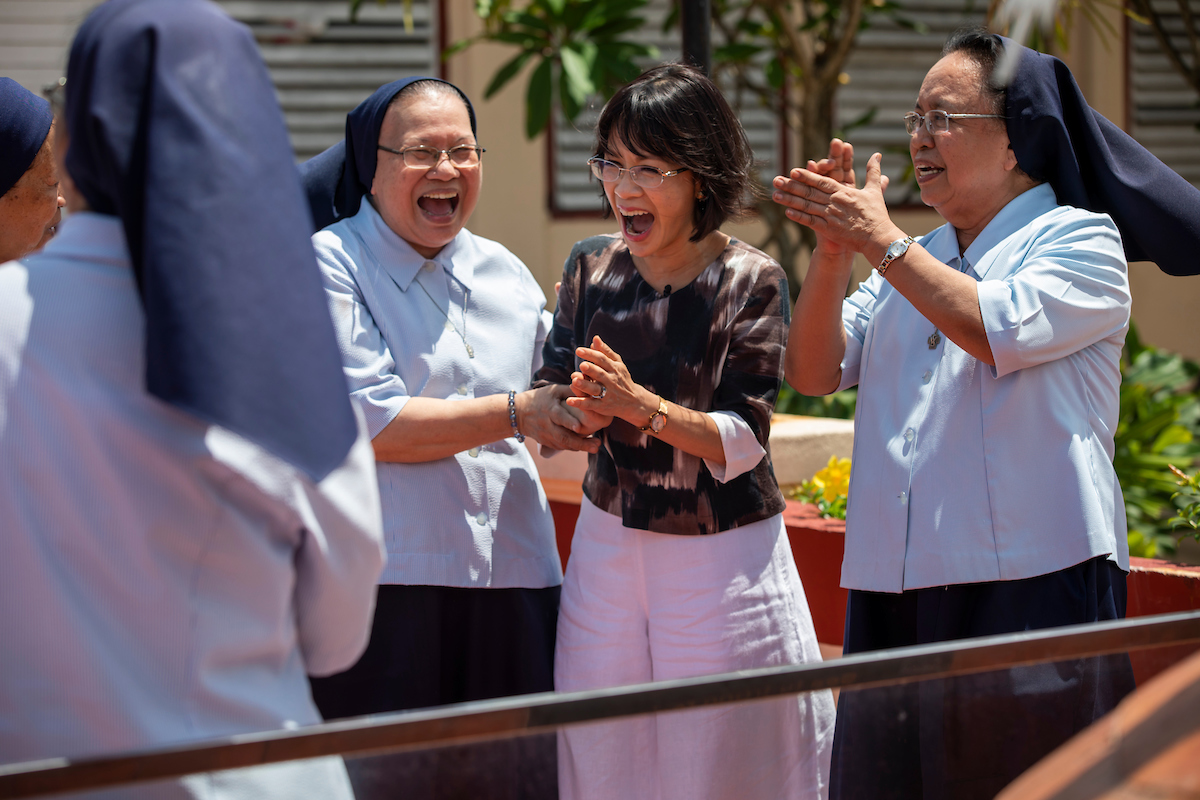
Tuminez’s lack of preparation became immediately apparent on her first day at her
new school: she didn’t know how to spell her name.
“We wrote down A-S-T-R-E-D,” she says. “I had no idea.”
Next came the classroom seating, arranged with the smartest student in the first seat,
first row, and ending with the least competent student in the last seat, last row.
Tuminez was placed in the last seat, last row. And on her first few assignments, she
received a grade of zero — which she didn’t know was bad.
“I kept getting a zero on all these quizzes, and I thought that was a really great
grade,” Tuminez says. “I’d run flying home to my hut, telling my father, ‘Hey, look
at this wonderful grade!’ He never told me a zero was a very bad grade.”
Soon, however, she began to catch up, and the shame-inducing seating chart awoke a
competitiveness in her. Within a few months, she was reading and writing. A few months
after that, she earned the first seat in the first row — head of the class. And by
the end of her first year, she was allowed to skip first grade and move straight into
second.
Later, when the school integrated the children from its free program with the rest
of the students, Tuminez continued pushing herself. While other children spent their
recess playing and buying roasted peanuts and Coca-Cola from vendors in the cafeteria,
Tuminez hid in the library, reading every book, shelf by shelf, left to right.
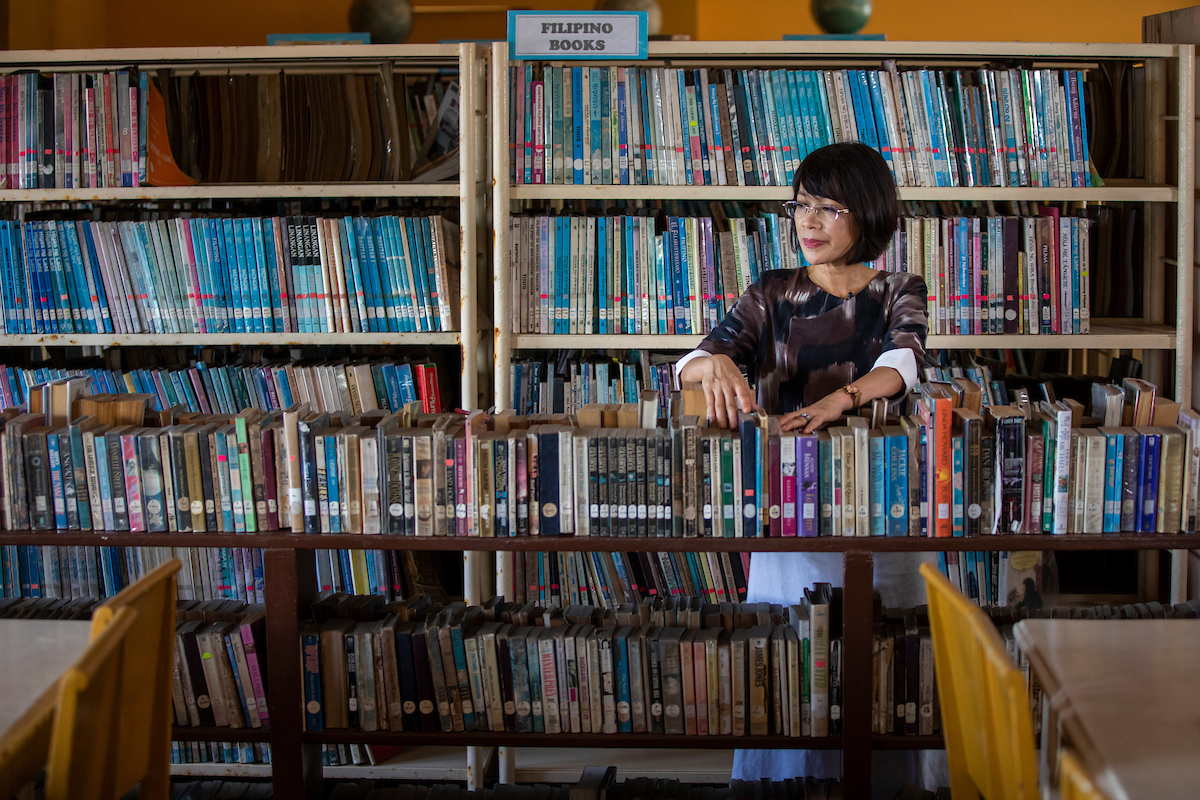
Classmate Roberto Villanueva, now a successful doctor, lawyer, and professor himself,
recalls Tuminez as “a skinny kid with a faded uniform, and her hair was tied with
a rubber band, like a fountain or a spring. She wasn’t really the silent type — she
was brilliant back then.”
Her achievements gave Tuminez a sense of pride and accomplishment she hadn’t thought
possible.
“I think every child wants to feel validated, and every child wants to feel that they're
good at something,” Tuminez says. “In the Philippines, if you grow up on a lower rung
in the socio-economic ladder, you end up being almost invisible. Your life means almost
nothing. To be able to say that I could beat the richer girls — the girls who came
from rich families with cars and maids — it was an amazing boost to my identity and
to my confidence, and to my ability to believe that I could be so much more than what
I thought I was."
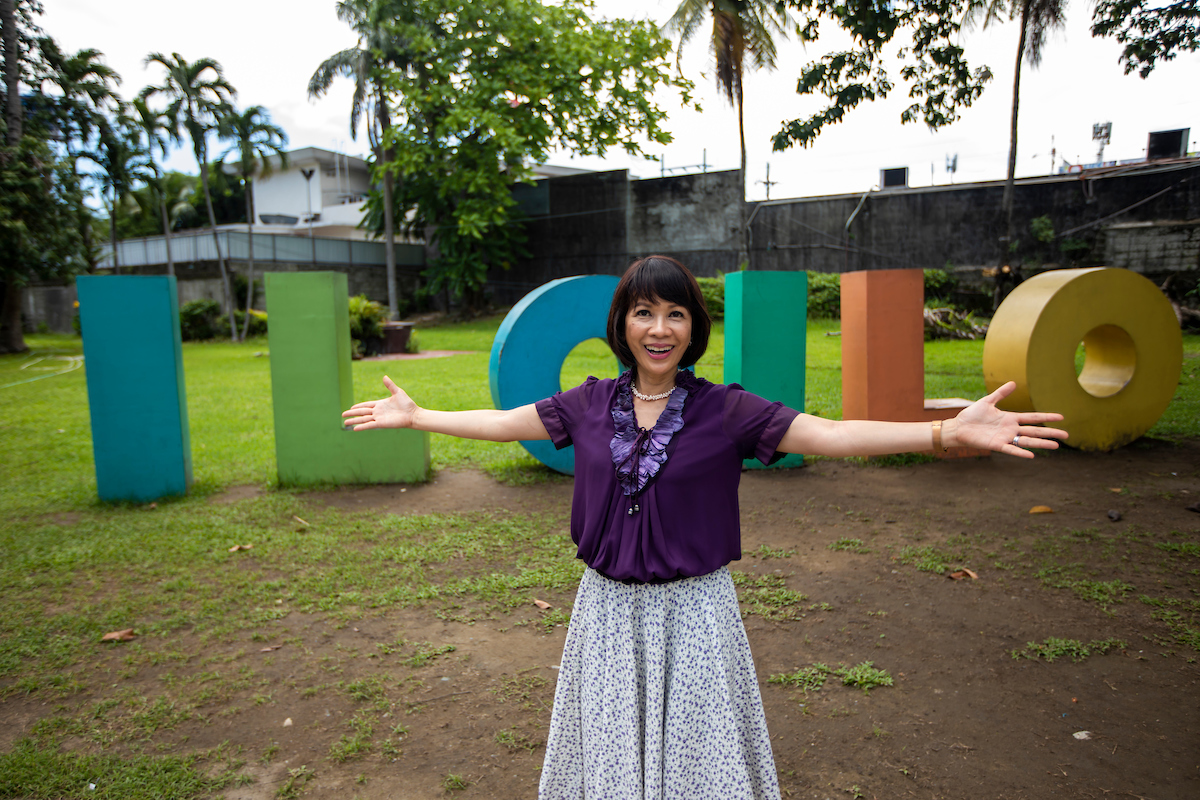
As Tuminez continued through high school, she still wasn’t sure what she wanted to
do with her life. Learning in itself was a powerful motivator, but she lacked the
role models in her life to show her a career path.
“I reflected on what I would do with my life, and realized I had to continue my education
because, at that point in time, the value of education was already very, very clear
to me,” she says. “Education also became the foundation of my own personality because
it was the one thing I was good at. To be poor but to know you're good at something
is wonderful; it gives you a lot of self-esteem and courage to keep moving.”
From her reading, Tuminez learned of a place called New York City, and by age 10,
she made a goal to live there. Around that time, her family also met missionaries
from The Church of Jesus Christ of Latter-day Saints, and Astrid first heard of a
place called Utah. By age 15, she had finished high school and was studying at the
University of the Philippines in Manila, on a full government scholarship, but she
dreamed of emigrating to America and attending Brigham Young University.
She was accepted to BYU and, in November 1982 — at 18 years old, wearing a faux silk
blouse and a self-described “big, poofy perm” — Astrid Tuminez first set foot on American
soil.
“My point of entry was California. My sister’s husband, who was in the Air Force,
picked me up,” Tuminez says, “and as we drove on the highway, I first saw the arches
of McDonald's, and I got so excited and wanted them to stop. They told me it was nothing
special, but I was so thrilled to be in America.”
At the University of the Philippines, Tuminez began and then dropped majors in chemical
engineering and pre-med. (Any notion of becoming a doctor ended swiftly when a teacher
asked class members to catch, kill, and dissect a cat as a class assignment, she says.)
At BYU, she discovered an aptitude for languages, especially Russian, and chose to
double major in Russian literature and international relations. Both would come to
define her future career.
“I was in the first batch of BYU students that went to Moscow to study Russian, led
by Prof. Gary Browning, who has been a lifetime mentor to me,” Tuminez says.
By her senior year at BYU, Tuminez was already looking forward to graduate school.
She applied to three: Harvard, Georgetown, and Yale. All three accepted her, but Harvard
offered a full-ride scholarship. So she headed east, and at a church gathering near
campus, she met a young Harvard undergrad, Jeffrey Stuart Tolk. Reports differ as
to who noticed whom first, but the two hit it off.
“In my mind, the first time I met her was at a dance,” Tolk says. “I saw her dancing,
and she was beautiful, and a good dancer. Just a sparkly, witty personality. I was
pretty much smitten.”
The following summer, Tuminez was working in Europe for Harvard’s Let’s Go budget
travel guide and staying with a friend’s parents in Paris, when she got an unexpected
phone call on her birthday. It was Tolk.
“I was like, ‘How did you get this phone number?’” Tuminez says. “Jeff was working
for Senator Al Gore, and it was before the days of the internet. He'd gone to the
Library of Congress, found a Paris phone book, and looked up the last name of the
people I was staying with. That was the moment I decided I was going to date him because,
if he could find me in Paris on my birthday, then he was definitely dating material.”

To believe in what is possible, whatever the hurdles and challenges are — that’s the culture I’d like UVU to have.
Tolk and Tuminez married on June 13, 1988, just two days after Tuminez completed a
master’s degree in Soviet Studies at Harvard. Tolk finished Harvard Law School and
began work as a legal clerk for the Supreme Court of Massachusetts, while Tuminez
worked on her doctorate in political science at MIT. Over the next several years,
the couple juggled jobs — some requiring long-distance travel — and education, as
well as discussions on when to start having children. Tuminez was intimidated by the
idea.
“To be very honest, I could never see myself as a mom,” she says. “I just couldn't
see myself being pregnant. That just seemed so alien. And raising children was just…how
do you do that? I couldn’t do that. I felt that I was not qualified to do that at
all.”
While both parents were working full-time and Tuminez was trying to finish her doctorate,
Tuminez found out she was pregnant. Her new challenges, she says, were the best thing
that could have happened.
“I wanted to have that doctoral degree before I delivered the baby,” Tuminez says.
“It just fired me up. It was probably my most productive time in life. When I first
found out I was pregnant, I was just falling apart. I thought I could handle anything
but having a child. But that's because I didn’t know what I was capable of doing.”
The experience, Tuminez says, taught her the full potential that women possess. She
and Tolk would go on to have three children total, all while both parents worked full-time.
“It made me realize, ‘Wow, women can do this?’” she says. “Because I was doing three
things: working full-time in New York City, writing the dissertation at night and
on weekends, and dealing with a pregnancy. For the first time in my life, I actually
understood the strength of women at a very granular level. Because to work was nothing
for me. To study was not much. But adding a pregnancy and delivering a baby, and still
continue everything else—to me, that was an amazing discovery.”
The support of her husband was key, Tuminez says — both had to make sacrifices for
each other to achieve their goals.
“I don't think I would have done as well as I've done without Jeff,” she says. “When
people ask me, ‘How did you do all this? How did you have three kids and still carry
on a very demanding professional life?’ I always say, without hesitation, that my
husband is fully integral to that success. It's a partnership.
“When we were dating, Jeff said to me, ‘You're responsible for your own happiness,’
and that just stuck so well in my head. I wasn't marrying a man so that he could be
responsible for my happiness. That's a really, really important message. Jeff respects
and honors all of my dreams and aspirations, and, in fact, no one is prouder of me.”

Work took Tuminez around the world over the next two decades. Most of that time was
spent in New York City, fulfilling her childhood dream of living in Manhattan. In
the early ‘90s, however, Tuminez was working for Harvard in Moscow, putting her Soviet
expertise to good use. Tuminez describes her relationship with Tolk as a “commuter
marriage.” Without email or the Internet, communication meant transatlantic phone
calls, usually in the middle of the night for one person or the other.
By 1992, Tuminez moved back to New York full time, where the couple would both work
for the next 13 years. Tuminez served in positions with the Carnegie Corporation of
New York, as a research associate and program officer, and with AIG Global Investments
as a research director.
Both Tuminez and Tolk were working in lower Manhattan on September 11, 2001, a harrowing
experience for both of them. Tolk said he actually had a meeting scheduled in the
World Trade Center for that afternoon. Tuminez, five months pregnant and also working
on Wall Street. at the time, was fortunate enough to have been picked up by a livery
driver shortly before the first tower fell. They drove to the Upper East Side, where
she picked up their daughter from school. Tolk had to walk home almost all the way.
“No phones would work,” Tolk says. “Landlines didn't work, cell phones didn't work,
so I couldn't contact Astrid, I couldn't contact my family, I couldn't contact anyone…It
was a very sobering moment.”
The family would eventually move further uptown, residing there until 2005, when Tolk
was offered a position with Hong Kong and Shanghai Banking Corporation (HSBC) in Hong
Kong.
After the birth of their second child, Tuminez thought she might take a one-year sabbatical.
But only two weeks after leaving her job on Wall Street, she was asked to serve as
a consultant to the U.S. Institute of Peace, which was involved in facilitating peace
negotiations between the government of the Philippines and the Moro Islamic Liberation
Front.
Having lived in New York for so many years, and lacking familiarity with the Muslim
areas of the southern Philippines, Tuminez struggled at first in her new role.
“When I first went in, I was very much in a New Yorker frame of mind,” Tuminez says.
“I was very formal and official—making appointments and sticking to official protocols,
and I fell flat on my face. It was just a huge failure at the beginning. One of the
Philippine officials told me the Muslims had sent a cable to Manila saying, ‘Who is
this woman and what planet is she from?’”
Humbled, Tuminez had to start from scratch, seeking to earn the people’s trust by
listening to them and learning their history. She also led a program to bring in negotiators
from other parts of the world to learn their stories and how they dealt with and negotiated
grievances related to history, land, and identity.
“I came to discover a very important part of Filipino history and culture that I did
not know as a Christian Filipino,” Tuminez says, “and to this day I'm deeply appreciative
of what I learned about listening to people, why they're hurting, and why they're
fighting. I learned that conflicts are rarely, if ever, a clear division of the good
people and the bad people — there are so many variables that create violent situations.”

In 2008, Tolk accepted a job in Singapore, and Tuminez was considering an offer to
join a big tech company at the same time. But a meeting with Kishore Mahbubani, the
founding dean of the Lee Kuan Yew School of Public Policy at the National University
of Singapore, drew her back to her first love: education.
“Within 15 minutes of meeting me, he said, ‘What would it take to get you to work
for this school? You could be faculty, you could be an administrator, you could be
anything,’” Tuminez says. “I was so impressed by that, that someone could spot me
as a talent for the institution and could make up his mind so quickly.”
Tuminez held several positions at the LKY School, where she taught more than 2,000
government and business leaders and served as assistant dean of executive education
and vice dean of research. As vice dean, she helped support faculty in getting funding
and disseminating their research results. While at the LKY School, she also founded
a publication called Global-Is-Asian (a play on “globalization”), to help advance
public policy discourse in Asia.
“That was really a very wonderful four years,” Tuminez says. “It was a great way to
get to know Singapore, as a public policy lab in particular, and also get to know
the rest of the emerging markets in the region.”
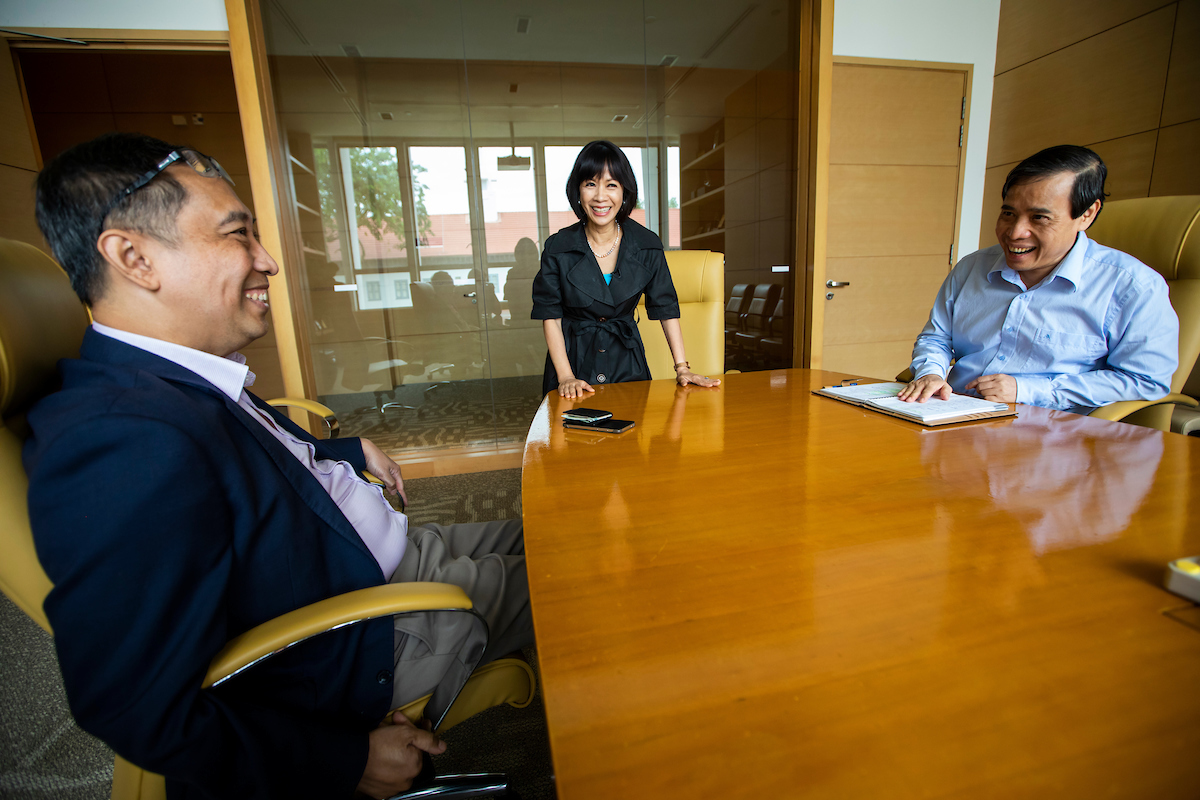
“Dr. Tuminez is not only an academic, or just a simple adviser,” says Vu Minh Khuong,
an associate professor at the LKY School and a Harvard Ph.D. “She easily stands out
in terms of vision, in terms of ideas, and in terms of energy to push things through.
Rather than just academic discussion, she is very action-oriented. That's a good thing.”
Tuminez left the LKY School in 2012 to join Microsoft in Singapore as regional director
of corporate, external, and legal affairs for Southeast Asia. In that role, her team
supported 15 countries, driving government affairs, policy and regulatory engagements,
academic and nonprofit relations, and other activities to enhance understanding and
use of technology for the public good.
While she enjoyed her position at Microsoft, Tuminez was intrigued when a friend from
UVU informed her of the presidency opening. At first, she didn’t think the position
was right for her.
“I knew the university as UVSC, Utah Valley State College,” Tuminez says, “and I thought,
no, it's not a good match.”
But her curiosity led her to further research, and the more she read, the more intrigued
she became. Programs like UVU’s Center for National Security Studies, Center for the
Study of Ethics, Center for Constitutional Studies, and the 70-plus countries represented
in UVU’s student body, along with the institution’s integrated mission model, piqued
her interest.
“I became more and more intrigued, and more and more impressed,” she says. “Although
I had spent an enormous amount of time with elite institutions, whether that's Harvard,
MIT, or the National University of Singapore, I realized that UVU could be even more
dynamic and inventive in ways that would truly transform lives.”
“I did have doubts initially about the fit between me and UVU, but it occurred to
me that, if I could bring to one place my competencies and skills and my passion for
education, my passion for students, and my fundamental love and respect for professors
and what they do — this was the place to do it.”
With self-described trepidation, Tuminez submitted her application. She was selected
as one of four finalists on April 12, and, a week later, the Utah State Board of Regents
appointed her as the seventh president of Utah Valley University.
“Dr. Tuminez has proven to be a dynamic leader across academic, nonprofit, public
policy, and corporate sectors. Throughout her storied career, she has focused on bridging
gaps in education and opportunity to make a difference in people's lives, which seamlessly
aligns with UVU's institutional mission and core themes," said Daniel W. Campbell,
chair of the Board of Regents at the time. "Dr. Tuminez’s experience, vision, and
dedication to student success will ensure that UVU continues to thrive in the years
ahead."
Tuminez will officially start her presidency at UVU on September 17, and while the
Orem campus is a long way from that nipa hut in the Philippines, she already knows
what she wants UVU to feel like: a home, for every student.
“Home is a place where I feel supported, safe, and accepted,” she says. “Home is also
a place where I can articulate my dreams, and feel that I have the support to make
those dreams come true. Finally, home to me is always an unforgettable place. To every
freshman, and every parent, and all of the students and others in our community today,
I hope that you come to UVU feeling that this is your home.”